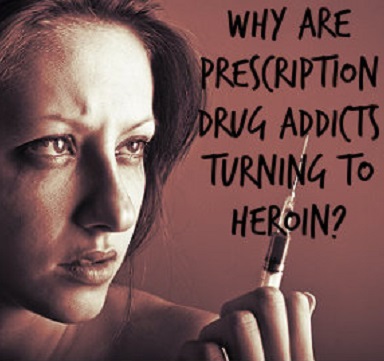Dirty Syringes Thrive As Prescription Drug Addicts Turn To Heroin
A recent report from Olympia, WA, calls for a citywide conversation regarding the growing problem of heroin abuse plaguing the area—particularly drawing attention to the widespread issue of dirty needles. Heroin abuse is damaging in a host of more obvious ways—addiction, destroyed relationships, torched careers and the direct physical consequences—but one of the biggest issues comes from the use of unclean needles. This conversation isn’t a comfortable one for many citizens, but it’s a problem that will not go away, particularly with the epidemic-level prescription drug abuse gripping the nation.
Prescription Drugs: A Gateway To Heroin?
 The prescription drug addiction crisis that America is facing has already been shown to have led users into heroin abuse. Understanding why requires some basic knowledge of the chemical similarity between the substances. The most effective painkillers are opioid drugs like oxycodone and hydrocodone (the active ingredients in OxyContin and Vicodin, respectively), substances derived from the opium poppy. This plant is the ultimate source of heroin, and the drugs are therefore effectively the same. Exceeding your doctor’s prescribed dosage heightens the narcotic effect of the substance, making it roughly comparable to taking a dose of heroin. This is why 12 million Americans used prescription painkillers non-medically in 2010 and why so many people become addicted and many of them overdose—but the supply isn’t always easy to come by.
The prescription drug addiction crisis that America is facing has already been shown to have led users into heroin abuse. Understanding why requires some basic knowledge of the chemical similarity between the substances. The most effective painkillers are opioid drugs like oxycodone and hydrocodone (the active ingredients in OxyContin and Vicodin, respectively), substances derived from the opium poppy. This plant is the ultimate source of heroin, and the drugs are therefore effectively the same. Exceeding your doctor’s prescribed dosage heightens the narcotic effect of the substance, making it roughly comparable to taking a dose of heroin. This is why 12 million Americans used prescription painkillers non-medically in 2010 and why so many people become addicted and many of them overdose—but the supply isn’t always easy to come by.
One of the unexpected downsides of cracking down on prescription drug abuse is that many people are left addicted to opiates but without the pills to satisfy their cravings. This problem is “solved” by many of the users by buying heroin — it’s easier to get and is cheaper than the medically legal versions prescribed by doctors.
Hidden Drug Problem
Olympia, WA, is experiencing an increase in heroin use. Previously, the heroin problem was primarily confined to grim alleyways in the inner city, but now—thanks in part to narcotic prescription medicines—it’s expanded into the suburbs, spreading across the city like a disease. While the obvious issues are the crimes associated with heroin abuse and the physical harm to the user, another immediate problem tied to increased heroin use is that of dirty needles littering the streets. The local paper, the “Olympian,” is calling for an open and frank discussion on the problem within the community.
Dirty Needles And Blood-Borne Viruses
Research from 2004 shows that one-fifth of HIV infections and the majority of hepatitis C infections were related to intravenous drug use, and one-quarter of America’s injecting drug users have HIV or AIDS. The reason is simple: with intravenous drug use, any case where two users share a needle represents a potential infection; the blood invariably remaining on the needle being plunged directly into the vein of the next user. In short, all needle-sharing is equivalent to unprotected sex. This is why needle-sharing is particularly ill-advised, but thinking realistically (particularly when accounting for the priorities of someone dependent on opiates) it’s clear that many users will take the risk to get their fix.
Needle Exchange Programs: Encouraging Addiction Or A Vital Service?
The problem with needle sharing is why needle exchange programs were created. The premise is simple: offer intravenous drug users a safe place to dispose of their used needles and offer them clean injecting equipment to reduce the risk of infections in the future. Olympia provides such a service and has for nearly 20 years. In 2012, about 950,000 dirty needles were collected and marginally fewer clean ones were distributed. The fact that the number of collections exceeds the number of distributions is a source of concern (the widespread discarded needles in locations like parks risk infecting children or non-using adults), but overall, the program undoubtedly reduces the numbers of blood-borne viruses.
However, critics argue that it isn’t right to distribute equipment to drug users who clearly have a problem, and that the programs merely allow them to continue on in addiction. This is an understandable criticism, but public health officials and those who operate the programs counter that the benefits of the programs outweigh the potential moral issues. Reducing the spread of HIV and hepatitis is a huge benefit, and it’s clear that the users aren’t only continuing to take heroin because they’ve been given free clean equipment; they are struggling with addiction and would continue using either way.
Harm Reduction As A Last Resort
It’s unreasonable to assume that every heroin user—or indeed every prescription drug user—will be able to quit effectively. Human history has repeatedly shown that not to be the case. This is why, in the most extreme cases, it’s better to focus on reducing harm as much as possible. The individual might be struggling to battle his demons and get clean, but does that mean we should stand by and do nothing while he risks HIV infection? It might make us feel like we live in a more harmonious world to pretend that these problems don’t exist, but it doesn’t improve the situation. If you turn a blind eye to the unnecessary suffering, you’d be fooling yourself to think it stopped happening.
See How Prescription Drug Abuse Is A Growing Problem On College Campuses – Click Here



